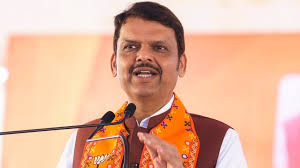Devendra Fadnavis at Express Adda: ‘If the Opposition fights us, we will welcome it. But where are they?’

In a sharp and strategic conversation held at the Indian Express Adda in Mumbai, Maharashtra’s Deputy Chief Minister Devendra Fadnavis threw a pointed challenge at India’s Opposition parties. “If the Opposition fights us, we will welcome it,” he said, “but where are they?”
The senior BJP leader, known for his administrative acumen and composed demeanor, didn’t mince words during the discussion. His message was clear: democracy thrives on contestation, but the Opposition, in his view, is failing to show up with conviction, direction, or leadership.
An Absent Opposition
Fadnavis’ rhetorical question—”where are they?”—was more than a jibe. It reflected a broader critique of India’s fragmented political landscape, especially in the wake of the 2024 Lok Sabha elections. He expressed concern that while the BJP-led NDA coalition was focused on governance and delivery, the Opposition was stuck in internal crises and lacked a coherent alternative vision.
“In a healthy democracy, we need a strong Opposition,” he said, “but they are either absent or indulging in tokenism. We are ready to fight them on ideas, but we need someone to show up.”
The ‘Vote Jihad’ and ‘Anarchist Forces’ Narrative
One of the more controversial moments of the conversation came when Fadnavis referenced what he termed “vote jihad”—a phrase that has drawn criticism from secular quarters. He linked this to what he described as “anarchist forces” that, according to him, had coalesced during Rahul Gandhi’s Bharat Jodo campaign.
Fadnavis alleged that some non-governmental organizations and civil society groups are attempting to create social unrest under the guise of activism. These groups, he argued, have contributed to polarized voting patterns that prioritize narrow identity politics over developmental agendas.
Critics may see these remarks as an attempt to delegitimize dissent, but Fadnavis held firm. “When nationalism is challenged in the name of activism, we must question the motive,” he stated.
Digital Governance and the ‘150-Day Challenge’
Shifting focus from political critique to administrative action, Fadnavis detailed the government’s performance plans for the next few months. Calling it the “150-day challenge,” he said the Maharashtra government would pursue major reforms in digital governance, public service delivery, and infrastructure development.
“Gone are the days when governments worked in silos,” he noted. “We are building a connected, efficient administration that puts citizens first.”
Among the highlights of this plan are:
- End-to-end digital public grievance redressal systems.
- Integrated e-governance dashboards.
- Streamlined infrastructure clearances for faster project rollout.
This emphasis on digital-first governance, he suggested, would also help eliminate middlemen and reduce corruption—long-standing issues in the state’s bureaucracy.
Mumbai’s Urban Future
Fadnavis, who has a reputation for delivering large infrastructure projects during his previous tenure as Chief Minister (2014–19), returned to one of his favorite themes: transforming Mumbai into a world-class metropolis.
His vision includes:
- Expansion of the Mumbai Metro network.
- Introduction of an integrated transport card for seamless intermodal travel.
- Completion of the Navi Mumbai Airport by August 2025.
- Speeding up the Coastal Road and Thane-Navi Mumbai elevated corridor.
- A major thrust on the Dharavi Redevelopment Project.
“We’re not just constructing buildings—we’re building hope, dignity, and opportunity,” he said of the Dharavi initiative, which aims to relocate slum dwellers into formal housing while sustaining their businesses.
In addition, the state is considering the introduction of air-conditioned local trains at existing fares and promoting water taxis as alternatives to road congestion.
Social Concerns and Controversies
The Deputy CM didn’t avoid sensitive social topics either. Addressing the ongoing debates around “love jihad,” he clarified that interfaith marriages were not the problem—deception was. “If a man lies about his identity to lure a woman into marriage, it is not love, it is a crime,” he said. A state-level committee is reportedly studying such incidents and may make recommendations soon.
He also touched on the recent controversy involving comedian Kunal Kamra, who faced backlash from BJP supporters. Fadnavis personally downplayed the issue but acknowledged that party workers often react emotionally to perceived slights against national symbols or leaders. “We may not agree with the style, but we must protect freedom of expression—up to a point where it doesn’t provoke hatred,” he said.
Political Strategy Going Forward
With state elections approaching, Fadnavis made it clear that the BJP was prepared—organizationally, ideologically, and administratively. The Shiv Sena (Shinde faction) and Ajit Pawar’s NCP are now part of the ruling alliance, creating a powerful but sometimes delicate coalition. Still, Fadnavis appeared confident that internal coordination would not be an issue.
He emphasized that the alliance partners shared the broader development agenda and had learned from past rifts. “We’ve matured. We’re no longer thinking of political optics alone; we’re focused on outcomes,” he said.
Conclusion: More Than Just Rhetoric
Devendra Fadnavis’s session at the Express Adda offered more than just political soundbites. It was a mix of governance updates, ideological affirmations, and pointed critiques of the Opposition. Whether one agrees with his framing or not, the session revealed a leader prepared for the next battle—administrative or electoral.
His final message echoed his opening challenge: “We want a robust debate. We want to fight on performance, ideas, and vision. But for that, the Opposition must first show up.”






